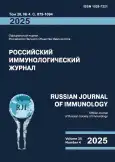Оценка влияния комплекса антигенов условно-патогенных бактерий на активацию экспрессии рецептора CD54 клетками промоноцитарной линии человека U937
- Авторы: Калиниченко Е.О.1, Козырева О.В.1, Сидоров Н.Г.1, Сорокина Е.В.1, Михайлова Н.А.1
-
Учреждения:
- ФГБНУ «Научно-исследовательский институт вакцин и сывороток имени И.И. Мечникова»
- Выпуск: Том 28, № 4 (2025)
- Страницы: 919-924
- Раздел: КРАТКИЕ СООБЩЕНИЯ
- URL: https://journals.rcsi.science/1028-7221/article/view/333251
- DOI: https://doi.org/10.46235/1028-7221-17236-AEO
- ID: 333251
Цитировать
Полный текст
Аннотация
Условно-патогенные бактерии играют важную роль в развитии респираторных инфекций, характеризующихся высокой заболеваемостью и смертностью. Перспективным направлением является применение препаратов на основе условно-патогенных бактерий, стимулирующих иммунитет. Важной задачей при их создании становится определение методов оценки и маркеров, отражающих усиление иммунного ответа. Известно, что для таких целей представляет интерес стимуляция миелоидных клеток. В качестве модели для анализа функциональной активности моноцитов и макрофагов широко применяется клеточная линия U937, происходящая из клеток гистиоцитарной лимфомы человека и обладающая характеристиками, близкими к промоноцитам. Рецептор молекулы CD54 (ICAM-1) представляет собой поверхностный гликопротеин, выполняющий функции адгезионного рецептора и играющий важную роль в обеспечении направленной миграции лейкоцитов из кровотока в воспаленные ткани. В условиях воспалительной стимуляции экспрессия ICAM-1 значительно возрастает на поверхности иммунных клеток, что позволяет рассматривать его как маркер активации компонентов врожденного иммунитета, включая клетки линии U937. В исследовании изучена активация экспрессии рецептора CD54 (ICAM-1) клетками человеческой промоноцитарной линии U937 под воздействием двух вариантов комплекса антигенов условно-патогенных бактерий: с добавлением иммуностимулируюшего сополимера и без него. В состав комплекса антигенов входили антигены из 4 видов условно-патогенных бактерий: Escherichia coli, Proteus vulgaris, Staphylococcus aureus, Klebsiella pneumoniae. В качестве дополнительного иммуностимулирующего агента использовали сополимер 2-метил-5-винилпиридина и N-винилпирролидона гидрохлорида. Для оценки экспрессии CD54 (ICAM-1) на клетках U937 использовали метод проточной цитометрии. Клетки стимулировали пептидогликаном S. aureus (положительный контроль) и исследуемыми вариантами комплекса антигенов условно-патогенных бактерий. Активность клеток оценивали с помощью коэффициента активации, отражающего увеличение экспрессии CD54. Значение коэффициента активации положительного контроля считалось убедительным при достижении не менее 50% (активация клеток эталонным антигеном), в то время как активация клеток под действием исследуемых вариантов комплекса антигенов условно-патогенных бактерий признавалась значимой при коэффициенте активации не менее 30%. Показано, что оба варианта и положительный контроль индуцировали дозозависимое увеличение экспрессии CD54. Оптимальная концентрация стимуляции соответствовала 25 мкг/мл. Выявленный эффект подтвердил способность комплекса антигенов условно-патогенных бактерий активировать клетки моноцитарно-макрофагального ряда и усиливать врожденный иммунный ответ. Полученные результаты подчеркивают значимость использования ICAM-1 как маркера активации иммунных клеток. Апробированный метод является перспективным для оценки эффективности препаратов на основе условно-патогенных бактерий.
Ключевые слова
Полный текст
Открыть статью на сайте журналаОб авторах
Евгений О. Калиниченко
ФГБНУ «Научно-исследовательский институт вакцин и сывороток имени И.И. Мечникова»
Email: gladius.domini@gmail.com
к.м.н., научный сотрудник лаборатории механизмов регуляции иммунитета
Россия, 105064, г. Москва, Малый Казенный пер., 5аОльга В. Козырева
ФГБНУ «Научно-исследовательский институт вакцин и сывороток имени И.И. Мечникова»
Email: kozyreva-11@mail.ru
научный сотрудник лаборатории механизмов регуляции иммунитета
Россия, 105064, г. Москва, Малый Казенный пер., 5аНикита Геннадьевич Сидоров
ФГБНУ «Научно-исследовательский институт вакцин и сывороток имени И.И. Мечникова»
Автор, ответственный за переписку.
Email: deel@yandex.ru
аспирант, младший научный сотрудник лаборатории протективных антигенов
Россия, 105064, г. Москва, Малый Казенный пер., 5аЕкатерина В. Сорокина
ФГБНУ «Научно-исследовательский институт вакцин и сывороток имени И.И. Мечникова»
Email: sorokina-cathrine@yandex.ru
д.м.н., профессор, заведующая лабораторией механизмов регуляции иммунитета
Россия, 105064, г. Москва, Малый Казенный пер., 5аНаталья А. Михайлова
ФГБНУ «Научно-исследовательский институт вакцин и сывороток имени И.И. Мечникова»
Email: n_michailova@inbox.ru
д.м.н., профессор, заведующая лабораторией протективных антигенов
Россия, 105064, г. Москва, Малый Казенный пер., 5аСписок литературы
- Михайлова Н.А., Солдатенкова А.В., Грубер И.М., Курбатова Е.А., Свитич О.А., Зверев В.В., Лазарев С.А., Асташкина Е.А. Способ получения поликомпонентной вакцины на основе антигенов условно-патогенных микроорганизмов. Патент RU 2799527 CI, 05.07.2023. [Mikhajlova N.A., Soldatenkova A.V., Gruber I.M., Kurbatova E.A., Svitich O.A., Zverev V.V., Lazarev S.A., Astashkina E.A. Method of obtaining a multicomponent vaccine based on antigens of opportunistic microorganisms. Patent RU 2799527CI, 05.07.2023].
- Ade N., Martinozzi-Teissier S., Pallardy M., Rousset F. Activation of U937 cells by contact sensitizers: CD86 expression is independent of apoptosis. J. Immunotoxicol., 2006, Vol. 3, no. 4, pp. 189-197.
- Bui T.M., Wiesolek H.L., Sumagin R. ICAM-1: A master regulator of cellular responses in inflammation, injury resolution, and tumorigenesis. J. Leukoc. Biol., 2020, Vol. 108, no. 3, pp. 787-799.
- Calderaro A., Buttrini M., Farina B., MontecchiniS., De Conto F., Chezzi C. Respiratory tract infections and laboratory diagnostic methods: a review with a focus on syndromic panel-based assays. Microorganisms, 2022, Vol. 10, no. 9, 1856. doi: 10.3390/microorganisms10091856.
- Cazzola M., Anapurapu S., Page C.P. Polyvalent mechanical bacterial lysate for the prevention of recurrent respiratory infections: a meta-analysis. Pulm. Pharmacol. Ther. 2012, Vol. 25, no. 1, pp. 62-68.
- GBD 2021 Upper Respiratory Infections Otitis Media Collaborators. Global, regional, and national burden of upper respiratory infections and otitis media, 1990–2021: a systematic analysis from the Global Burden of Disease Study 2021. Lancet Infect. Dis., 2025, Vol. 25, no. 1, pp. 36-51.
- Lee R.A., Boucher H.W. Respiratory tract infections in the postpandemic era: a return to basics and call to action. Infect. Dis. Clin. North Am., 2024, Vol. 38, no.1, pp. xiii–xv.
- Nascimento C.R., Rodrigues Fernandes N.A., Gonzalez Maldonado L.A., Rossa Junior C. Comparison of monocytic cell lines U937 and THP-1 as macrophage models for in vitro studies. Biochem. Biophys. Rep., 2022, Vol. 32, 101383. doi: 10.1016/j.bbrep.2022.101383.
- Piroird C., Ovigne J.M., Rousset F., Martinozzi-Teissier S., Gomes C., Cotovio J., Alépée N. The Myeloid U937 Skin Sensitization Test (U-SENS) addresses the activation of dendritic cell event in the adverse outcome pathway for skin sensitization. Toxicol. In Vitro, 2015, Vol. 29, no. 5, pp. 901-916.
- Sundström C., Nilsson K. Establishment and characterization of a human histiocytic lymphoma cell line (U-937). Int. J. Cancer, 1976, Vol. 17, no. 5, pp. 565-577.
Дополнительные файлы







